NURS2098: Recovery Focused Nursing Care Plan for Rachelle
VerifiedAdded on 2022/08/24
|12
|2264
|27
Practical Assignment
AI Summary
This assignment presents a comprehensive nursing care plan designed for a 31-year-old married woman, Rachelle, experiencing perinatal depression with anhedonia, anxiety, and difficulties coping with her newborn. The plan, developed by a nursing student, utilizes a recovery-focused approach, prioritizing Rachelle's identified goals and issues, such as regaining self-worth and improving daily functioning. It outlines her strengths, including awareness of her condition and willingness to seek help, and details consumer and nursing interventions. These interventions encompass therapeutic communication, cognitive and interpersonal therapies, self-care guidelines, and support from family and healthcare professionals. The plan also addresses impaired cognition and somatic preoccupations. The assignment includes references to support the care plan's evidence-based approach.
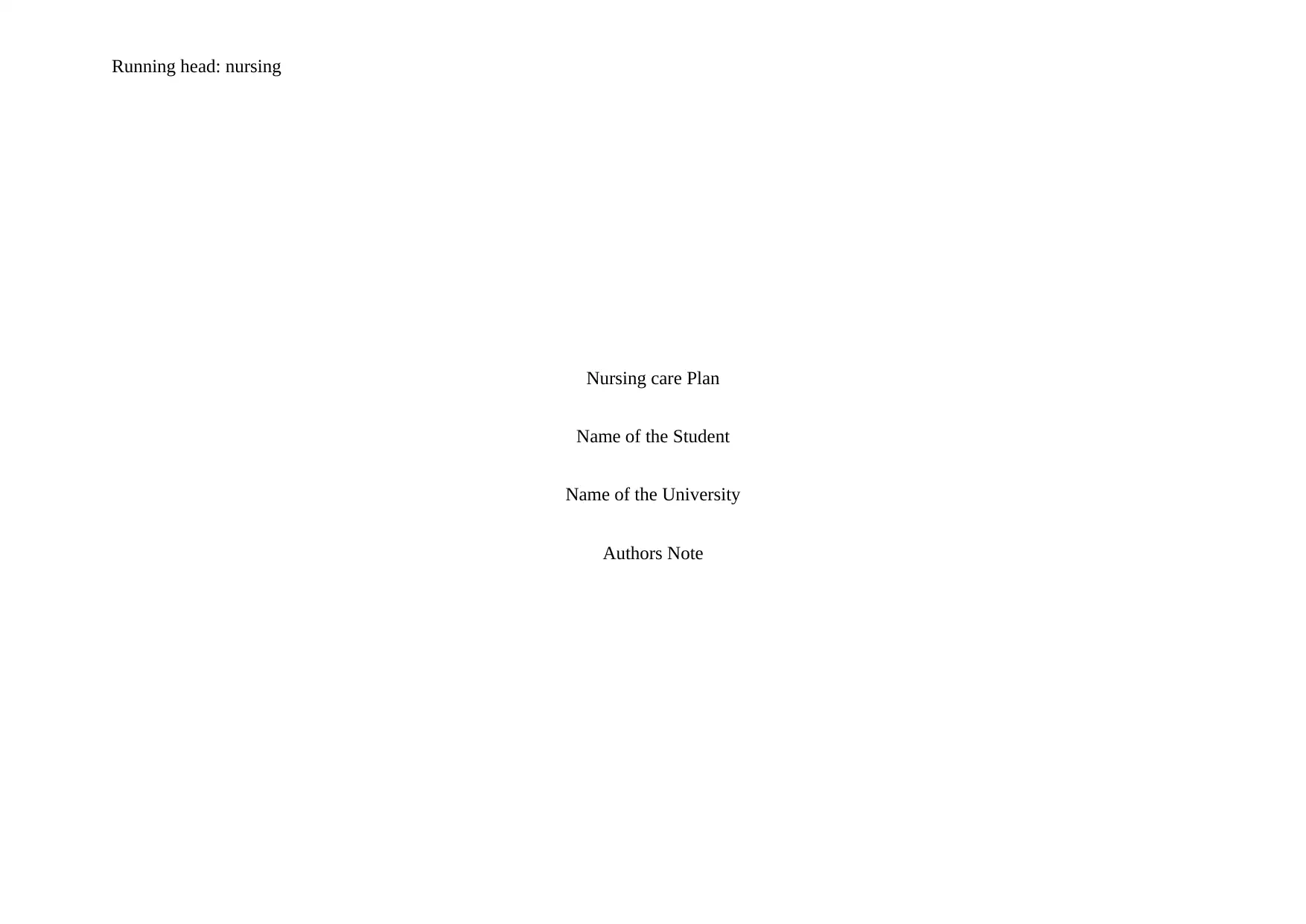
Running head: nursing
Nursing care Plan
Name of the Student
Name of the University
Authors Note
Nursing care Plan
Name of the Student
Name of the University
Authors Note
Secure Best Marks with AI Grader
Need help grading? Try our AI Grader for instant feedback on your assignments.
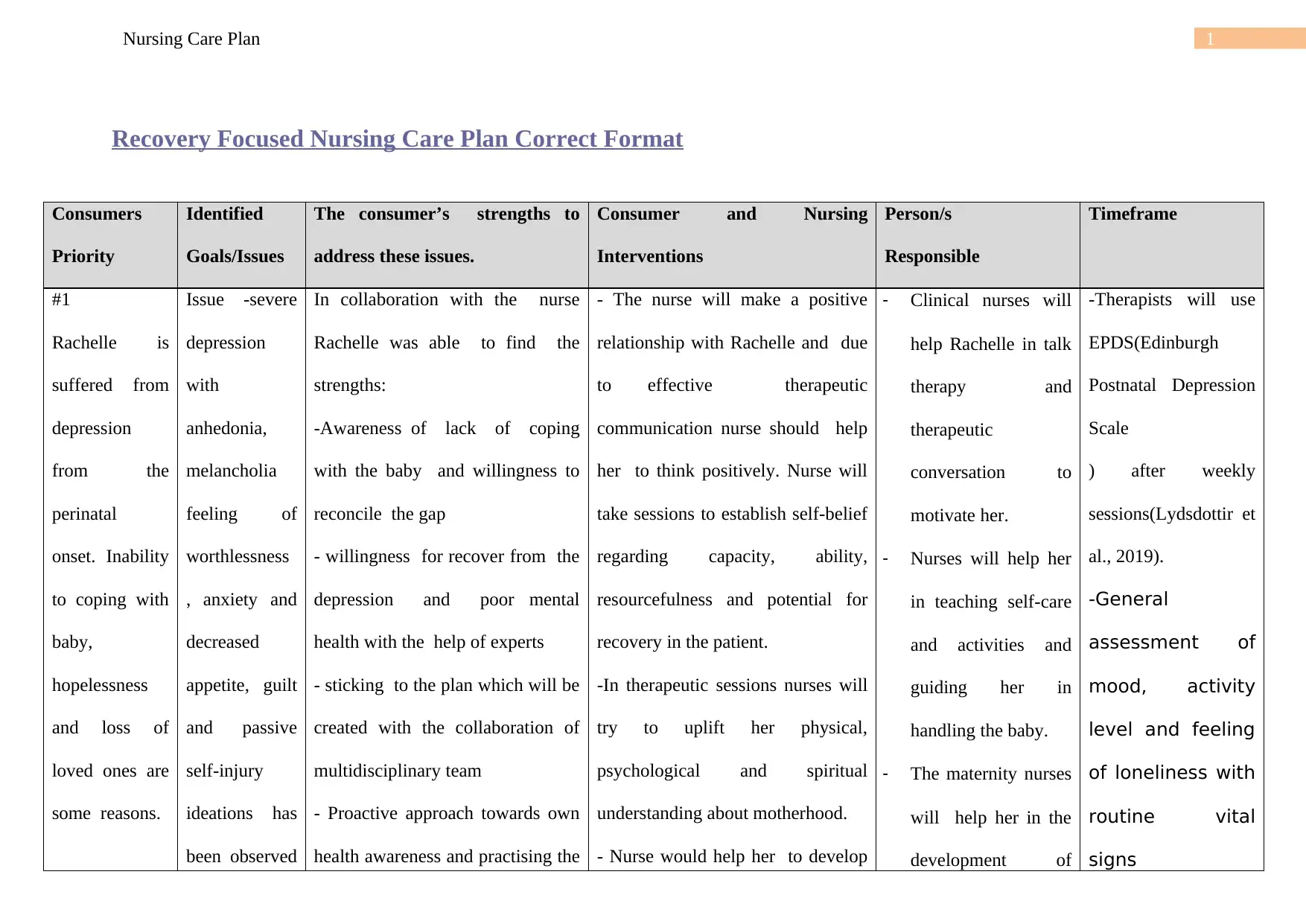
1Nursing Care Plan
Recovery Focused Nursing Care Plan Correct Format
Consumers
Priority
Identified
Goals/Issues
The consumer’s strengths to
address these issues.
Consumer and Nursing
Interventions
Person/s
Responsible
Timeframe
#1
Rachelle is
suffered from
depression
from the
perinatal
onset. Inability
to coping with
baby,
hopelessness
and loss of
loved ones are
some reasons.
Issue -severe
depression
with
anhedonia,
melancholia
feeling of
worthlessness
, anxiety and
decreased
appetite, guilt
and passive
self-injury
ideations has
been observed
In collaboration with the nurse
Rachelle was able to find the
strengths:
-Awareness of lack of coping
with the baby and willingness to
reconcile the gap
- willingness for recover from the
depression and poor mental
health with the help of experts
- sticking to the plan which will be
created with the collaboration of
multidisciplinary team
- Proactive approach towards own
health awareness and practising the
- The nurse will make a positive
relationship with Rachelle and due
to effective therapeutic
communication nurse should help
her to think positively. Nurse will
take sessions to establish self-belief
regarding capacity, ability,
resourcefulness and potential for
recovery in the patient.
-In therapeutic sessions nurses will
try to uplift her physical,
psychological and spiritual
understanding about motherhood.
- Nurse would help her to develop
- Clinical nurses will
help Rachelle in talk
therapy and
therapeutic
conversation to
motivate her.
- Nurses will help her
in teaching self-care
and activities and
guiding her in
handling the baby.
- The maternity nurses
will help her in the
development of
-Therapists will use
EPDS(Edinburgh
Postnatal Depression
Scale
) after weekly
sessions(Lydsdottir et
al., 2019).
-General
assessment of
mood, activity
level and feeling
of loneliness with
routine vital
signs
Recovery Focused Nursing Care Plan Correct Format
Consumers
Priority
Identified
Goals/Issues
The consumer’s strengths to
address these issues.
Consumer and Nursing
Interventions
Person/s
Responsible
Timeframe
#1
Rachelle is
suffered from
depression
from the
perinatal
onset. Inability
to coping with
baby,
hopelessness
and loss of
loved ones are
some reasons.
Issue -severe
depression
with
anhedonia,
melancholia
feeling of
worthlessness
, anxiety and
decreased
appetite, guilt
and passive
self-injury
ideations has
been observed
In collaboration with the nurse
Rachelle was able to find the
strengths:
-Awareness of lack of coping
with the baby and willingness to
reconcile the gap
- willingness for recover from the
depression and poor mental
health with the help of experts
- sticking to the plan which will be
created with the collaboration of
multidisciplinary team
- Proactive approach towards own
health awareness and practising the
- The nurse will make a positive
relationship with Rachelle and due
to effective therapeutic
communication nurse should help
her to think positively. Nurse will
take sessions to establish self-belief
regarding capacity, ability,
resourcefulness and potential for
recovery in the patient.
-In therapeutic sessions nurses will
try to uplift her physical,
psychological and spiritual
understanding about motherhood.
- Nurse would help her to develop
- Clinical nurses will
help Rachelle in talk
therapy and
therapeutic
conversation to
motivate her.
- Nurses will help her
in teaching self-care
and activities and
guiding her in
handling the baby.
- The maternity nurses
will help her in the
development of
-Therapists will use
EPDS(Edinburgh
Postnatal Depression
Scale
) after weekly
sessions(Lydsdottir et
al., 2019).
-General
assessment of
mood, activity
level and feeling
of loneliness with
routine vital
signs
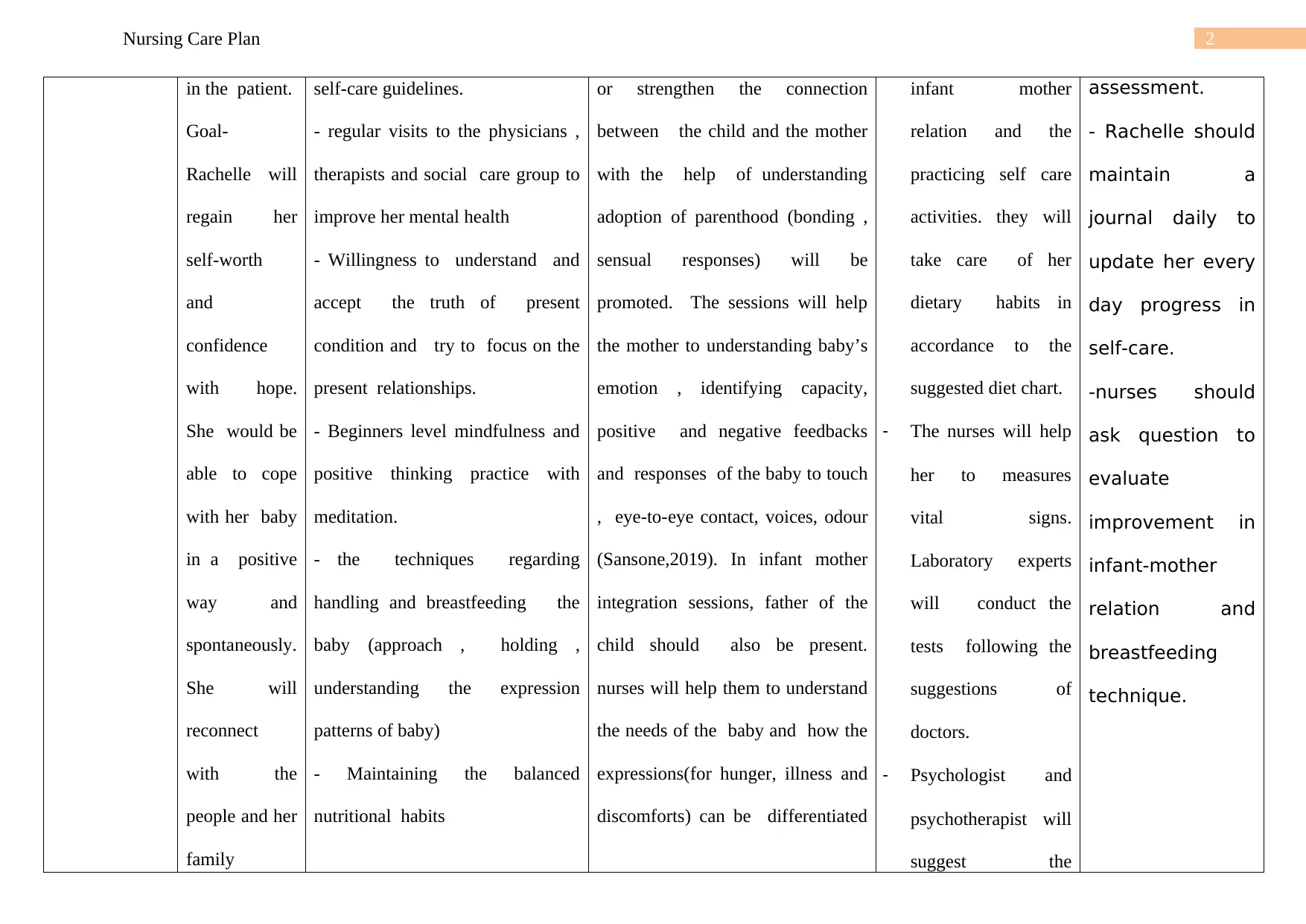
2Nursing Care Plan
in the patient.
Goal-
Rachelle will
regain her
self-worth
and
confidence
with hope.
She would be
able to cope
with her baby
in a positive
way and
spontaneously.
She will
reconnect
with the
people and her
family
self-care guidelines.
- regular visits to the physicians ,
therapists and social care group to
improve her mental health
- Willingness to understand and
accept the truth of present
condition and try to focus on the
present relationships.
- Beginners level mindfulness and
positive thinking practice with
meditation.
- the techniques regarding
handling and breastfeeding the
baby (approach , holding ,
understanding the expression
patterns of baby)
- Maintaining the balanced
nutritional habits
or strengthen the connection
between the child and the mother
with the help of understanding
adoption of parenthood (bonding ,
sensual responses) will be
promoted. The sessions will help
the mother to understanding baby’s
emotion , identifying capacity,
positive and negative feedbacks
and responses of the baby to touch
, eye-to-eye contact, voices, odour
(Sansone,2019). In infant mother
integration sessions, father of the
child should also be present.
nurses will help them to understand
the needs of the baby and how the
expressions(for hunger, illness and
discomforts) can be differentiated
infant mother
relation and the
practicing self care
activities. they will
take care of her
dietary habits in
accordance to the
suggested diet chart.
- The nurses will help
her to measures
vital signs.
Laboratory experts
will conduct the
tests following the
suggestions of
doctors.
- Psychologist and
psychotherapist will
suggest the
assessment.
- Rachelle should
maintain a
journal daily to
update her every
day progress in
self-care.
-nurses should
ask question to
evaluate
improvement in
infant-mother
relation and
breastfeeding
technique.
in the patient.
Goal-
Rachelle will
regain her
self-worth
and
confidence
with hope.
She would be
able to cope
with her baby
in a positive
way and
spontaneously.
She will
reconnect
with the
people and her
family
self-care guidelines.
- regular visits to the physicians ,
therapists and social care group to
improve her mental health
- Willingness to understand and
accept the truth of present
condition and try to focus on the
present relationships.
- Beginners level mindfulness and
positive thinking practice with
meditation.
- the techniques regarding
handling and breastfeeding the
baby (approach , holding ,
understanding the expression
patterns of baby)
- Maintaining the balanced
nutritional habits
or strengthen the connection
between the child and the mother
with the help of understanding
adoption of parenthood (bonding ,
sensual responses) will be
promoted. The sessions will help
the mother to understanding baby’s
emotion , identifying capacity,
positive and negative feedbacks
and responses of the baby to touch
, eye-to-eye contact, voices, odour
(Sansone,2019). In infant mother
integration sessions, father of the
child should also be present.
nurses will help them to understand
the needs of the baby and how the
expressions(for hunger, illness and
discomforts) can be differentiated
infant mother
relation and the
practicing self care
activities. they will
take care of her
dietary habits in
accordance to the
suggested diet chart.
- The nurses will help
her to measures
vital signs.
Laboratory experts
will conduct the
tests following the
suggestions of
doctors.
- Psychologist and
psychotherapist will
suggest the
assessment.
- Rachelle should
maintain a
journal daily to
update her every
day progress in
self-care.
-nurses should
ask question to
evaluate
improvement in
infant-mother
relation and
breastfeeding
technique.
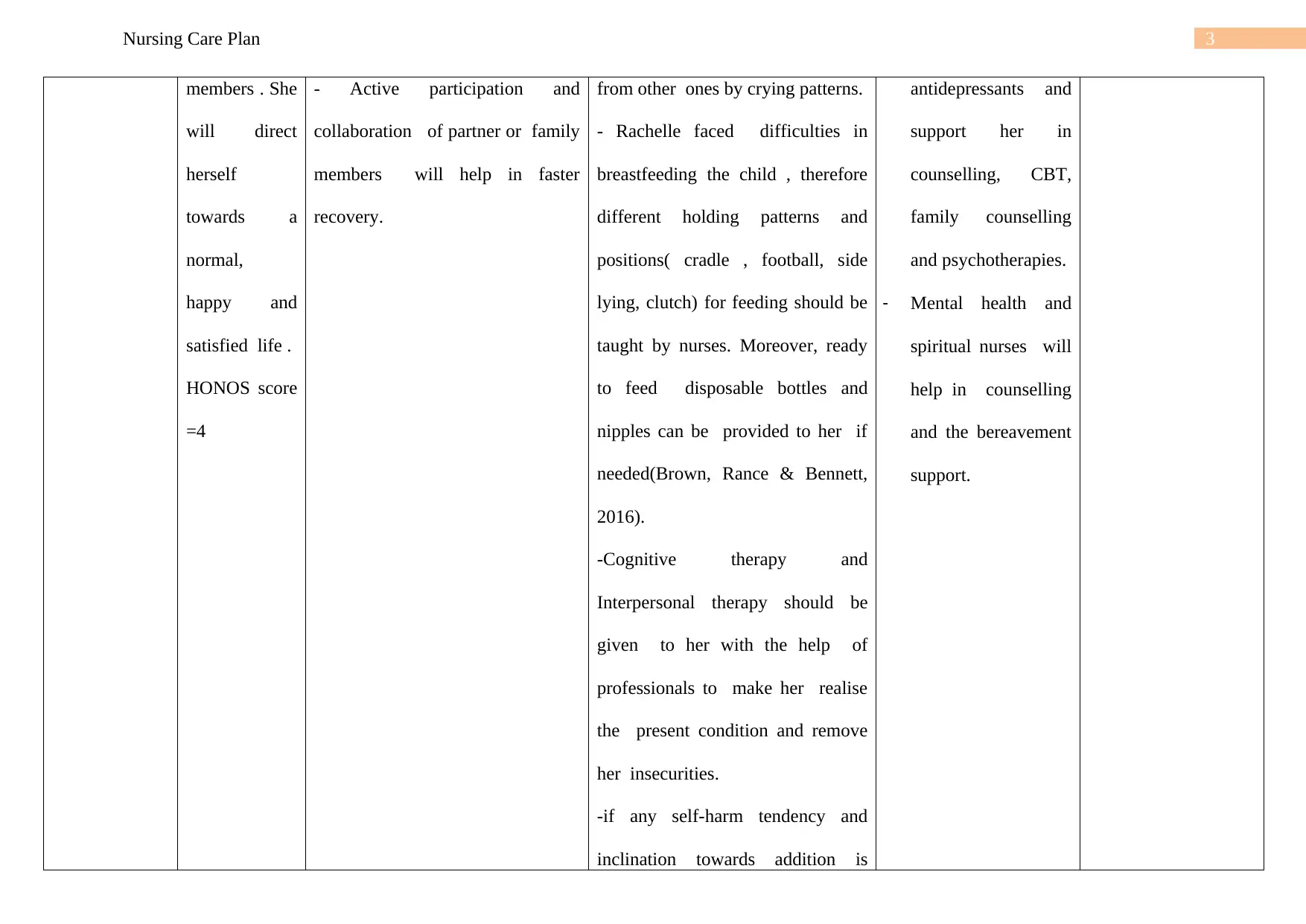
3Nursing Care Plan
members . She
will direct
herself
towards a
normal,
happy and
satisfied life .
HONOS score
=4
- Active participation and
collaboration of partner or family
members will help in faster
recovery.
from other ones by crying patterns.
- Rachelle faced difficulties in
breastfeeding the child , therefore
different holding patterns and
positions( cradle , football, side
lying, clutch) for feeding should be
taught by nurses. Moreover, ready
to feed disposable bottles and
nipples can be provided to her if
needed(Brown, Rance & Bennett,
2016).
-Cognitive therapy and
Interpersonal therapy should be
given to her with the help of
professionals to make her realise
the present condition and remove
her insecurities.
-if any self-harm tendency and
inclination towards addition is
antidepressants and
support her in
counselling, CBT,
family counselling
and psychotherapies.
- Mental health and
spiritual nurses will
help in counselling
and the bereavement
support.
members . She
will direct
herself
towards a
normal,
happy and
satisfied life .
HONOS score
=4
- Active participation and
collaboration of partner or family
members will help in faster
recovery.
from other ones by crying patterns.
- Rachelle faced difficulties in
breastfeeding the child , therefore
different holding patterns and
positions( cradle , football, side
lying, clutch) for feeding should be
taught by nurses. Moreover, ready
to feed disposable bottles and
nipples can be provided to her if
needed(Brown, Rance & Bennett,
2016).
-Cognitive therapy and
Interpersonal therapy should be
given to her with the help of
professionals to make her realise
the present condition and remove
her insecurities.
-if any self-harm tendency and
inclination towards addition is
antidepressants and
support her in
counselling, CBT,
family counselling
and psychotherapies.
- Mental health and
spiritual nurses will
help in counselling
and the bereavement
support.
Secure Best Marks with AI Grader
Need help grading? Try our AI Grader for instant feedback on your assignments.
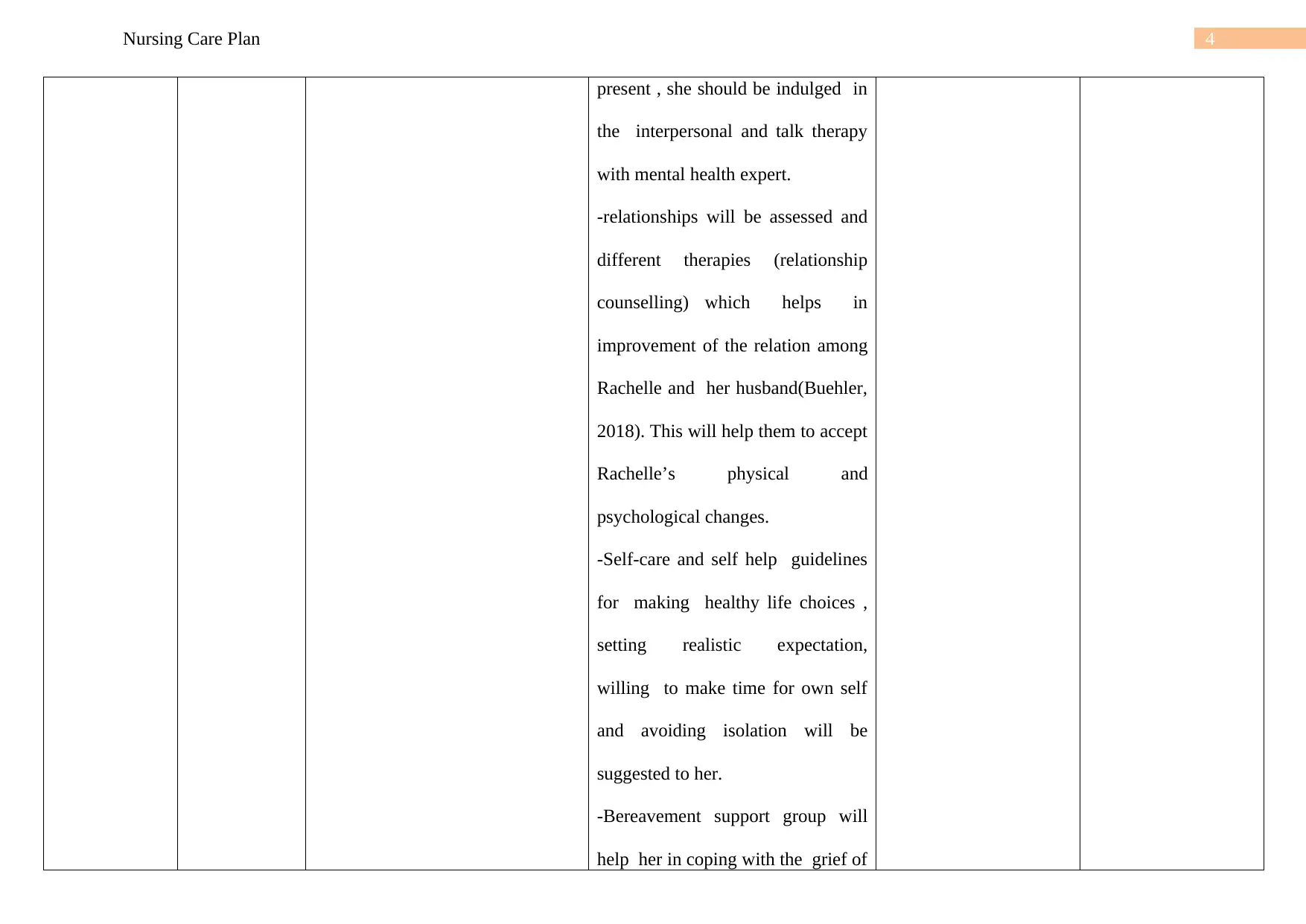
4Nursing Care Plan
present , she should be indulged in
the interpersonal and talk therapy
with mental health expert.
-relationships will be assessed and
different therapies (relationship
counselling) which helps in
improvement of the relation among
Rachelle and her husband(Buehler,
2018). This will help them to accept
Rachelle’s physical and
psychological changes.
-Self-care and self help guidelines
for making healthy life choices ,
setting realistic expectation,
willing to make time for own self
and avoiding isolation will be
suggested to her.
-Bereavement support group will
help her in coping with the grief of
present , she should be indulged in
the interpersonal and talk therapy
with mental health expert.
-relationships will be assessed and
different therapies (relationship
counselling) which helps in
improvement of the relation among
Rachelle and her husband(Buehler,
2018). This will help them to accept
Rachelle’s physical and
psychological changes.
-Self-care and self help guidelines
for making healthy life choices ,
setting realistic expectation,
willing to make time for own self
and avoiding isolation will be
suggested to her.
-Bereavement support group will
help her in coping with the grief of
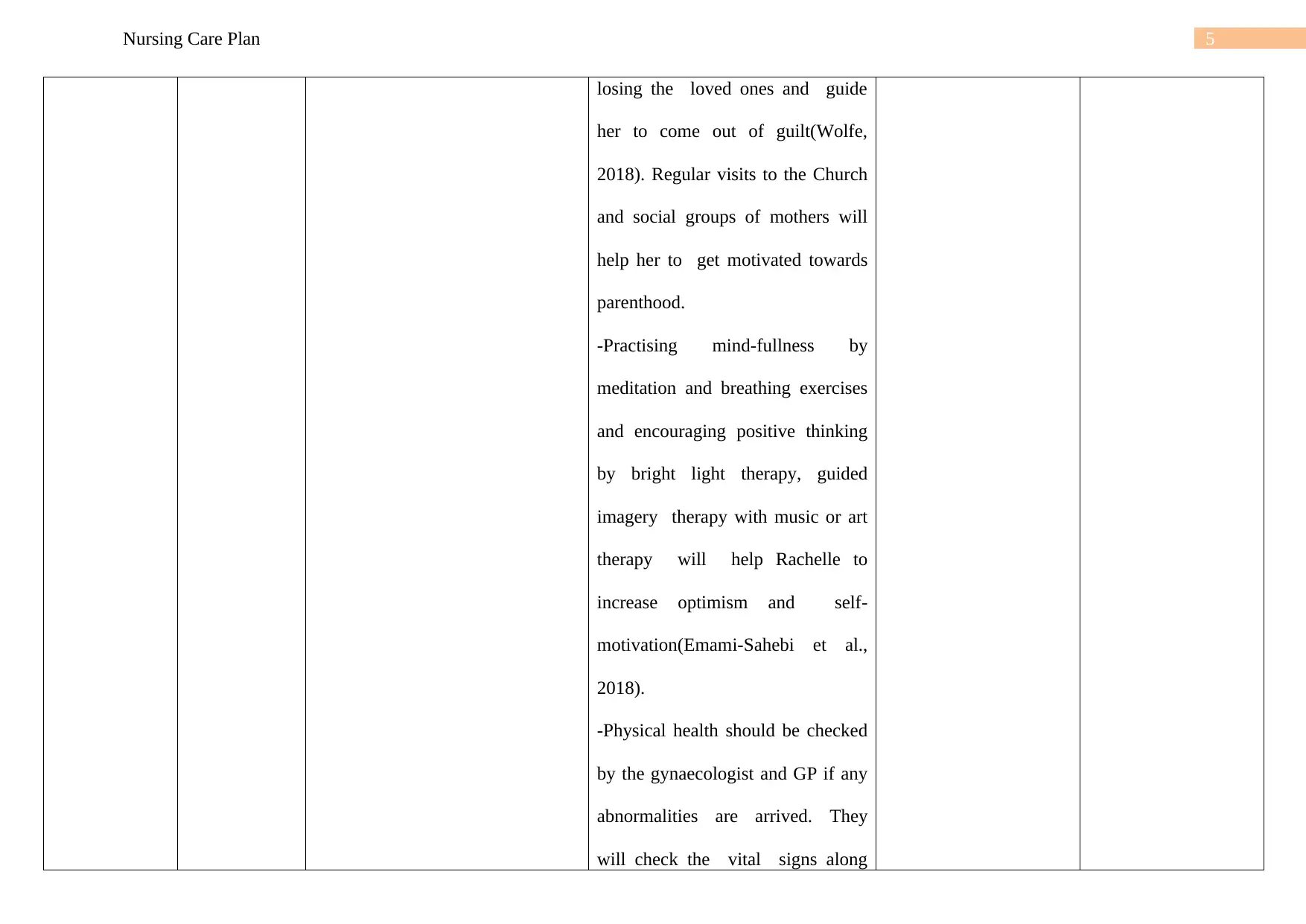
5Nursing Care Plan
losing the loved ones and guide
her to come out of guilt(Wolfe,
2018). Regular visits to the Church
and social groups of mothers will
help her to get motivated towards
parenthood.
-Practising mind-fullness by
meditation and breathing exercises
and encouraging positive thinking
by bright light therapy, guided
imagery therapy with music or art
therapy will help Rachelle to
increase optimism and self-
motivation(Emami-Sahebi et al.,
2018).
-Physical health should be checked
by the gynaecologist and GP if any
abnormalities are arrived. They
will check the vital signs along
losing the loved ones and guide
her to come out of guilt(Wolfe,
2018). Regular visits to the Church
and social groups of mothers will
help her to get motivated towards
parenthood.
-Practising mind-fullness by
meditation and breathing exercises
and encouraging positive thinking
by bright light therapy, guided
imagery therapy with music or art
therapy will help Rachelle to
increase optimism and self-
motivation(Emami-Sahebi et al.,
2018).
-Physical health should be checked
by the gynaecologist and GP if any
abnormalities are arrived. They
will check the vital signs along
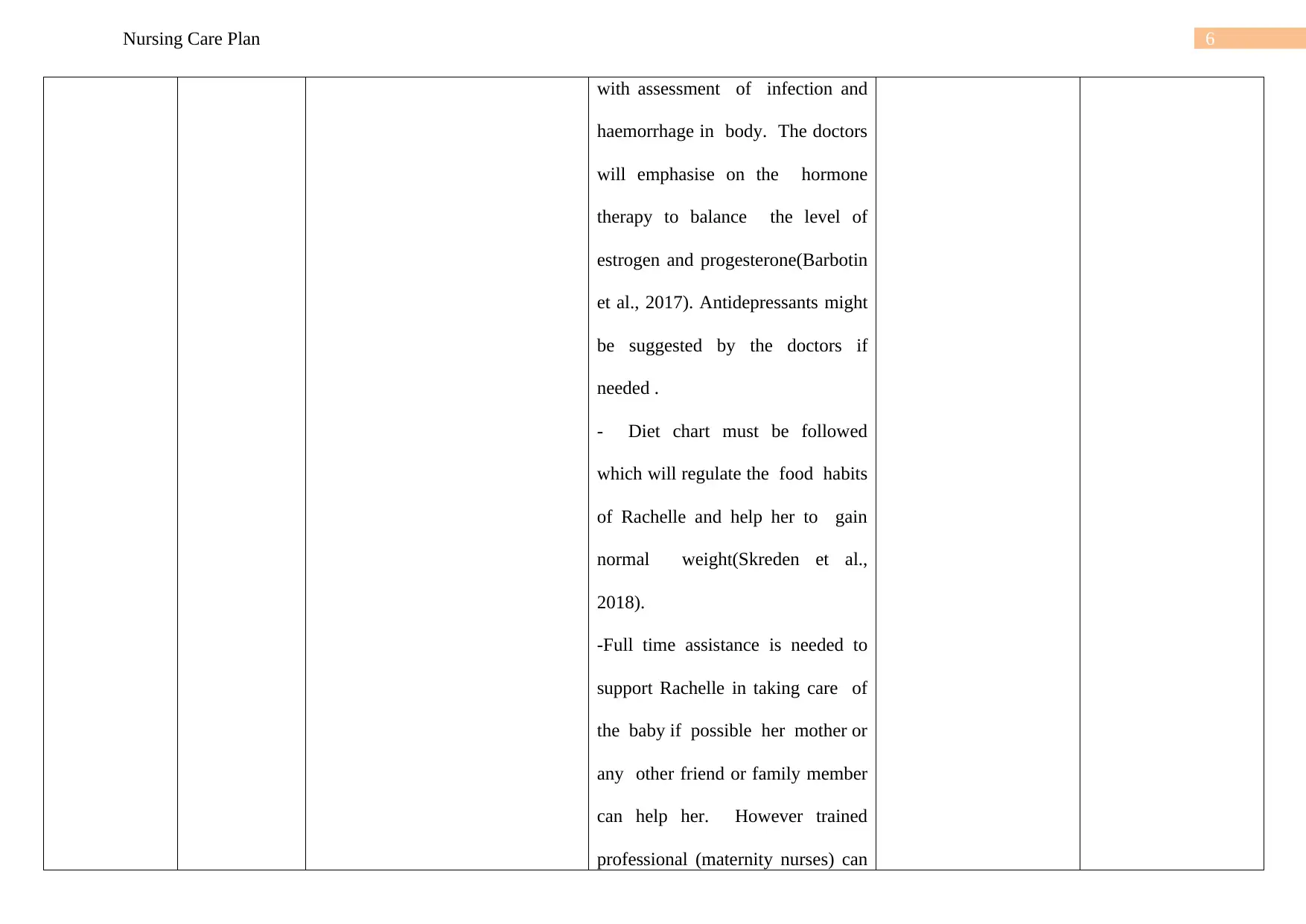
6Nursing Care Plan
with assessment of infection and
haemorrhage in body. The doctors
will emphasise on the hormone
therapy to balance the level of
estrogen and progesterone(Barbotin
et al., 2017). Antidepressants might
be suggested by the doctors if
needed .
- Diet chart must be followed
which will regulate the food habits
of Rachelle and help her to gain
normal weight(Skreden et al.,
2018).
-Full time assistance is needed to
support Rachelle in taking care of
the baby if possible her mother or
any other friend or family member
can help her. However trained
professional (maternity nurses) can
with assessment of infection and
haemorrhage in body. The doctors
will emphasise on the hormone
therapy to balance the level of
estrogen and progesterone(Barbotin
et al., 2017). Antidepressants might
be suggested by the doctors if
needed .
- Diet chart must be followed
which will regulate the food habits
of Rachelle and help her to gain
normal weight(Skreden et al.,
2018).
-Full time assistance is needed to
support Rachelle in taking care of
the baby if possible her mother or
any other friend or family member
can help her. However trained
professional (maternity nurses) can
Paraphrase This Document
Need a fresh take? Get an instant paraphrase of this document with our AI Paraphraser
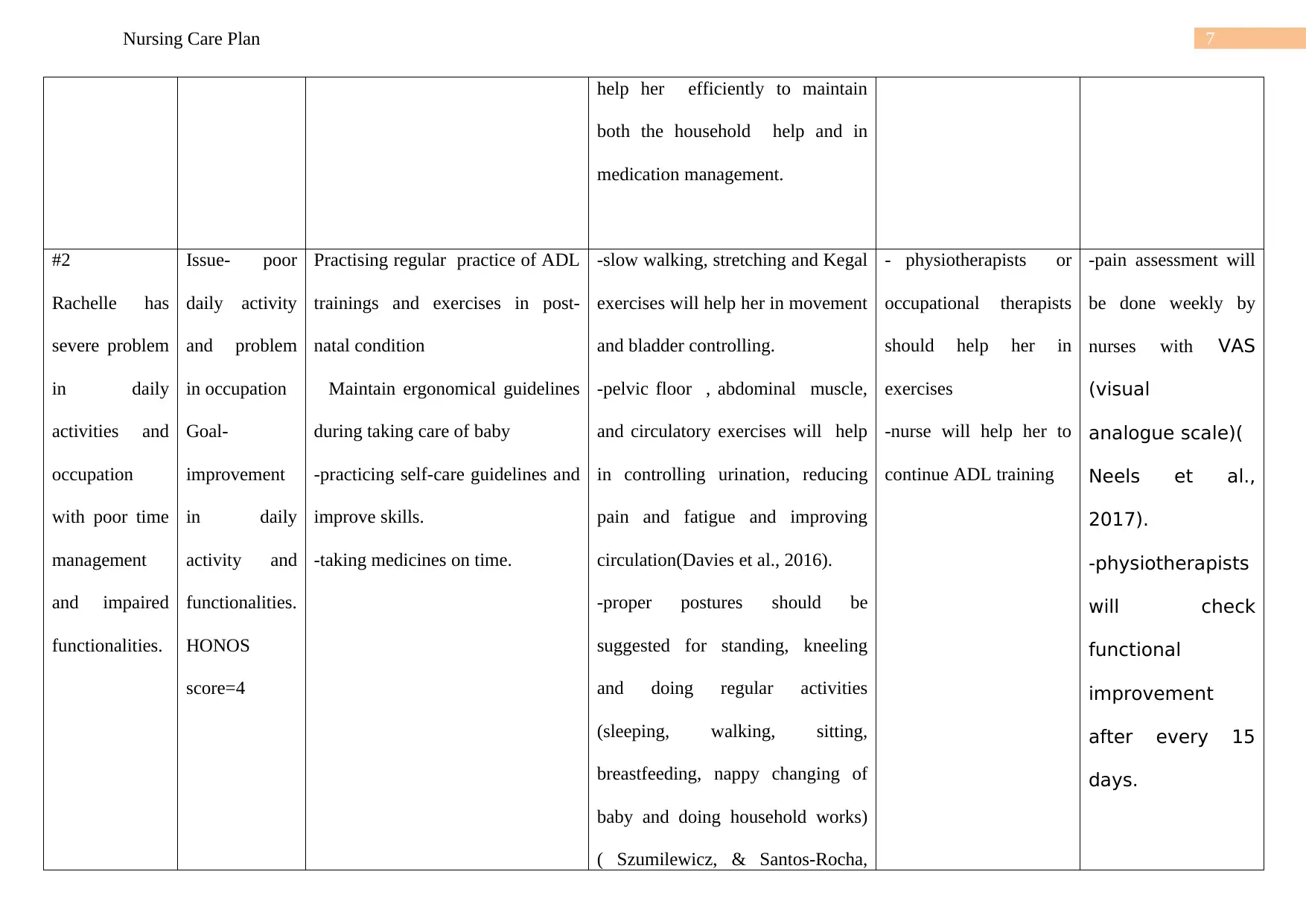
7Nursing Care Plan
help her efficiently to maintain
both the household help and in
medication management.
#2
Rachelle has
severe problem
in daily
activities and
occupation
with poor time
management
and impaired
functionalities.
Issue- poor
daily activity
and problem
in occupation
Goal-
improvement
in daily
activity and
functionalities.
HONOS
score=4
Practising regular practice of ADL
trainings and exercises in post-
natal condition
Maintain ergonomical guidelines
during taking care of baby
-practicing self-care guidelines and
improve skills.
-taking medicines on time.
-slow walking, stretching and Kegal
exercises will help her in movement
and bladder controlling.
-pelvic floor , abdominal muscle,
and circulatory exercises will help
in controlling urination, reducing
pain and fatigue and improving
circulation(Davies et al., 2016).
-proper postures should be
suggested for standing, kneeling
and doing regular activities
(sleeping, walking, sitting,
breastfeeding, nappy changing of
baby and doing household works)
( Szumilewicz, & Santos-Rocha,
- physiotherapists or
occupational therapists
should help her in
exercises
-nurse will help her to
continue ADL training
-pain assessment will
be done weekly by
nurses with VAS
(visual
analogue scale)(
Neels et al.,
2017).
-physiotherapists
will check
functional
improvement
after every 15
days.
help her efficiently to maintain
both the household help and in
medication management.
#2
Rachelle has
severe problem
in daily
activities and
occupation
with poor time
management
and impaired
functionalities.
Issue- poor
daily activity
and problem
in occupation
Goal-
improvement
in daily
activity and
functionalities.
HONOS
score=4
Practising regular practice of ADL
trainings and exercises in post-
natal condition
Maintain ergonomical guidelines
during taking care of baby
-practicing self-care guidelines and
improve skills.
-taking medicines on time.
-slow walking, stretching and Kegal
exercises will help her in movement
and bladder controlling.
-pelvic floor , abdominal muscle,
and circulatory exercises will help
in controlling urination, reducing
pain and fatigue and improving
circulation(Davies et al., 2016).
-proper postures should be
suggested for standing, kneeling
and doing regular activities
(sleeping, walking, sitting,
breastfeeding, nappy changing of
baby and doing household works)
( Szumilewicz, & Santos-Rocha,
- physiotherapists or
occupational therapists
should help her in
exercises
-nurse will help her to
continue ADL training
-pain assessment will
be done weekly by
nurses with VAS
(visual
analogue scale)(
Neels et al.,
2017).
-physiotherapists
will check
functional
improvement
after every 15
days.
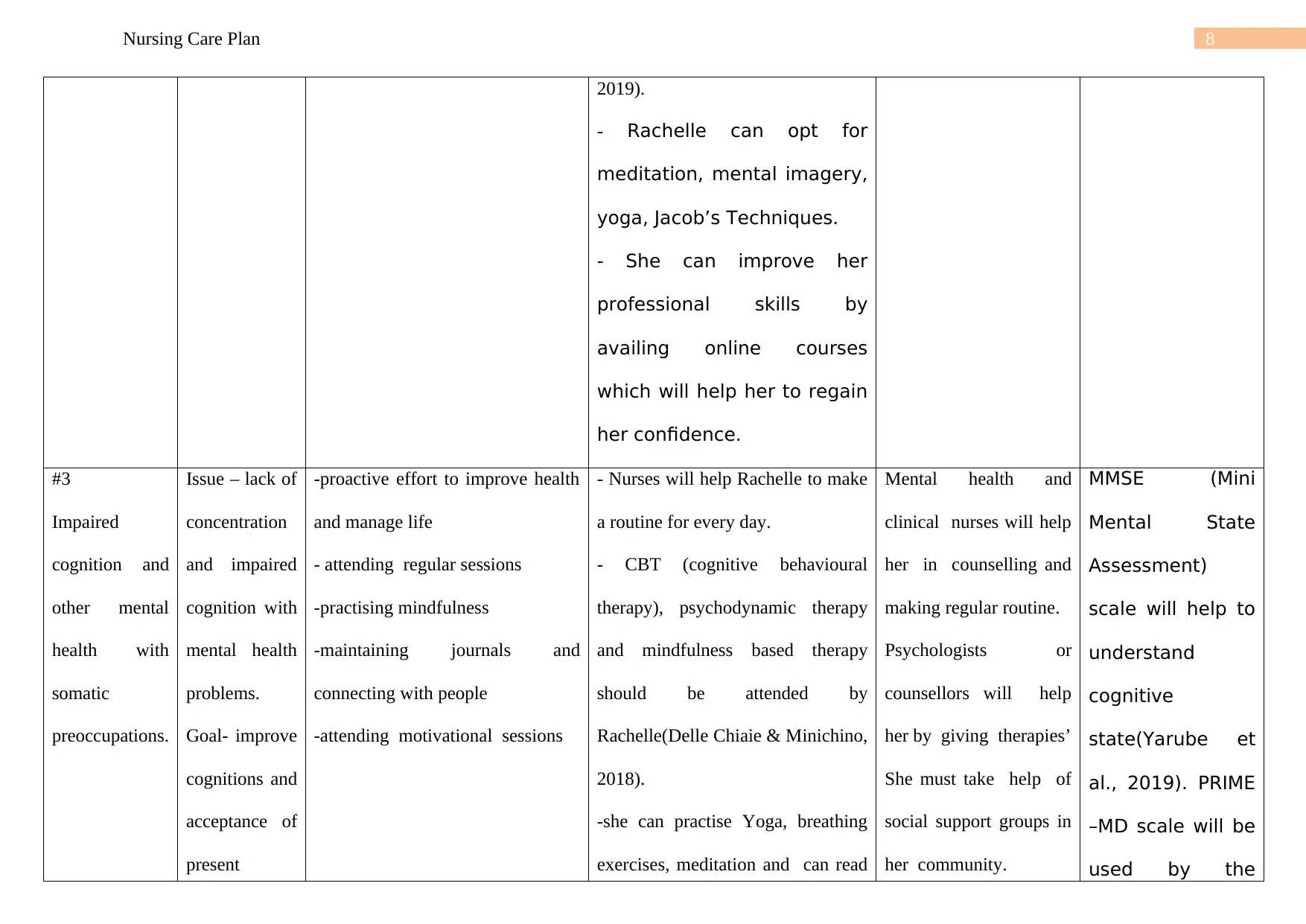
8Nursing Care Plan
2019).
- Rachelle can opt for
meditation, mental imagery,
yoga, Jacob’s Techniques.
- She can improve her
professional skills by
availing online courses
which will help her to regain
her confidence.
#3
Impaired
cognition and
other mental
health with
somatic
preoccupations.
Issue – lack of
concentration
and impaired
cognition with
mental health
problems.
Goal- improve
cognitions and
acceptance of
present
-proactive effort to improve health
and manage life
- attending regular sessions
-practising mindfulness
-maintaining journals and
connecting with people
-attending motivational sessions
- Nurses will help Rachelle to make
a routine for every day.
- CBT (cognitive behavioural
therapy), psychodynamic therapy
and mindfulness based therapy
should be attended by
Rachelle(Delle Chiaie & Minichino,
2018).
-she can practise Yoga, breathing
exercises, meditation and can read
Mental health and
clinical nurses will help
her in counselling and
making regular routine.
Psychologists or
counsellors will help
her by giving therapies’
She must take help of
social support groups in
her community.
MMSE (Mini
Mental State
Assessment)
scale will help to
understand
cognitive
state(Yarube et
al., 2019). PRIME
–MD scale will be
used by the
2019).
- Rachelle can opt for
meditation, mental imagery,
yoga, Jacob’s Techniques.
- She can improve her
professional skills by
availing online courses
which will help her to regain
her confidence.
#3
Impaired
cognition and
other mental
health with
somatic
preoccupations.
Issue – lack of
concentration
and impaired
cognition with
mental health
problems.
Goal- improve
cognitions and
acceptance of
present
-proactive effort to improve health
and manage life
- attending regular sessions
-practising mindfulness
-maintaining journals and
connecting with people
-attending motivational sessions
- Nurses will help Rachelle to make
a routine for every day.
- CBT (cognitive behavioural
therapy), psychodynamic therapy
and mindfulness based therapy
should be attended by
Rachelle(Delle Chiaie & Minichino,
2018).
-she can practise Yoga, breathing
exercises, meditation and can read
Mental health and
clinical nurses will help
her in counselling and
making regular routine.
Psychologists or
counsellors will help
her by giving therapies’
She must take help of
social support groups in
her community.
MMSE (Mini
Mental State
Assessment)
scale will help to
understand
cognitive
state(Yarube et
al., 2019). PRIME
–MD scale will be
used by the
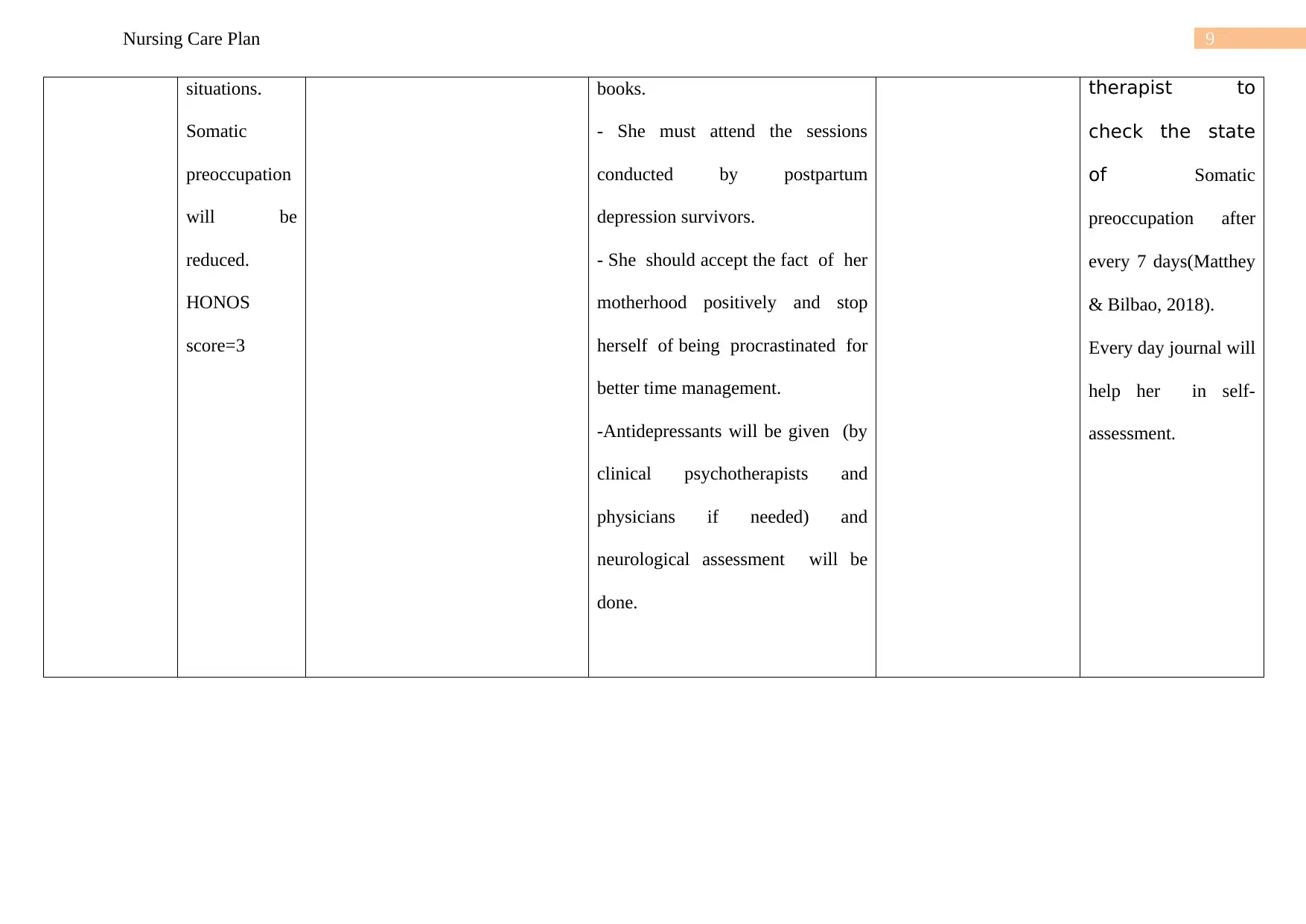
9Nursing Care Plan
situations.
Somatic
preoccupation
will be
reduced.
HONOS
score=3
books.
- She must attend the sessions
conducted by postpartum
depression survivors.
- She should accept the fact of her
motherhood positively and stop
herself of being procrastinated for
better time management.
-Antidepressants will be given (by
clinical psychotherapists and
physicians if needed) and
neurological assessment will be
done.
therapist to
check the state
of Somatic
preoccupation after
every 7 days(Matthey
& Bilbao, 2018).
Every day journal will
help her in self-
assessment.
situations.
Somatic
preoccupation
will be
reduced.
HONOS
score=3
books.
- She must attend the sessions
conducted by postpartum
depression survivors.
- She should accept the fact of her
motherhood positively and stop
herself of being procrastinated for
better time management.
-Antidepressants will be given (by
clinical psychotherapists and
physicians if needed) and
neurological assessment will be
done.
therapist to
check the state
of Somatic
preoccupation after
every 7 days(Matthey
& Bilbao, 2018).
Every day journal will
help her in self-
assessment.
Secure Best Marks with AI Grader
Need help grading? Try our AI Grader for instant feedback on your assignments.
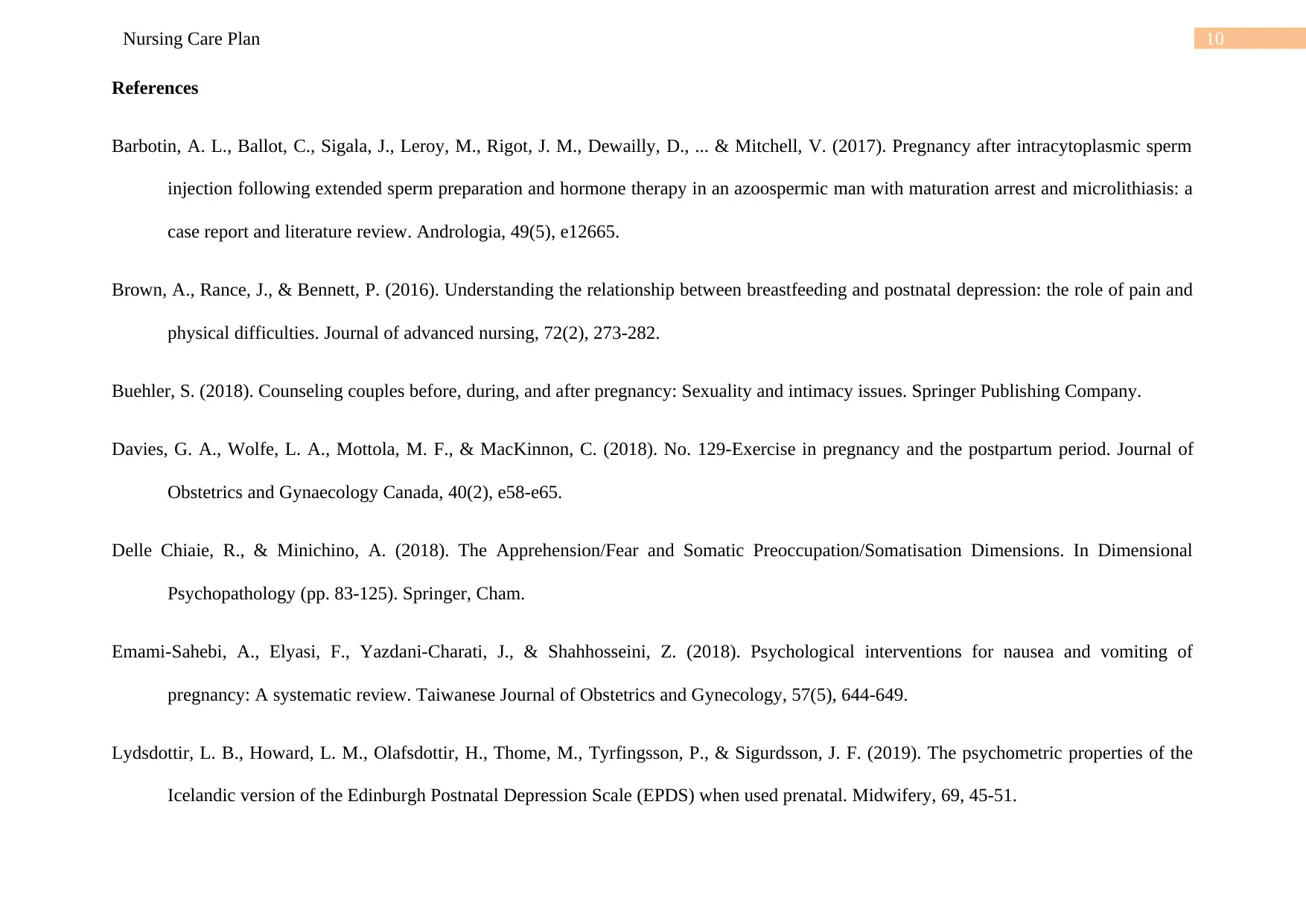
10Nursing Care Plan
References
Barbotin, A. L., Ballot, C., Sigala, J., Leroy, M., Rigot, J. M., Dewailly, D., ... & Mitchell, V. (2017). Pregnancy after intracytoplasmic sperm
injection following extended sperm preparation and hormone therapy in an azoospermic man with maturation arrest and microlithiasis: a
case report and literature review. Andrologia, 49(5), e12665.
Brown, A., Rance, J., & Bennett, P. (2016). Understanding the relationship between breastfeeding and postnatal depression: the role of pain and
physical difficulties. Journal of advanced nursing, 72(2), 273-282.
Buehler, S. (2018). Counseling couples before, during, and after pregnancy: Sexuality and intimacy issues. Springer Publishing Company.
Davies, G. A., Wolfe, L. A., Mottola, M. F., & MacKinnon, C. (2018). No. 129-Exercise in pregnancy and the postpartum period. Journal of
Obstetrics and Gynaecology Canada, 40(2), e58-e65.
Delle Chiaie, R., & Minichino, A. (2018). The Apprehension/Fear and Somatic Preoccupation/Somatisation Dimensions. In Dimensional
Psychopathology (pp. 83-125). Springer, Cham.
Emami-Sahebi, A., Elyasi, F., Yazdani-Charati, J., & Shahhosseini, Z. (2018). Psychological interventions for nausea and vomiting of
pregnancy: A systematic review. Taiwanese Journal of Obstetrics and Gynecology, 57(5), 644-649.
Lydsdottir, L. B., Howard, L. M., Olafsdottir, H., Thome, M., Tyrfingsson, P., & Sigurdsson, J. F. (2019). The psychometric properties of the
Icelandic version of the Edinburgh Postnatal Depression Scale (EPDS) when used prenatal. Midwifery, 69, 45-51.
References
Barbotin, A. L., Ballot, C., Sigala, J., Leroy, M., Rigot, J. M., Dewailly, D., ... & Mitchell, V. (2017). Pregnancy after intracytoplasmic sperm
injection following extended sperm preparation and hormone therapy in an azoospermic man with maturation arrest and microlithiasis: a
case report and literature review. Andrologia, 49(5), e12665.
Brown, A., Rance, J., & Bennett, P. (2016). Understanding the relationship between breastfeeding and postnatal depression: the role of pain and
physical difficulties. Journal of advanced nursing, 72(2), 273-282.
Buehler, S. (2018). Counseling couples before, during, and after pregnancy: Sexuality and intimacy issues. Springer Publishing Company.
Davies, G. A., Wolfe, L. A., Mottola, M. F., & MacKinnon, C. (2018). No. 129-Exercise in pregnancy and the postpartum period. Journal of
Obstetrics and Gynaecology Canada, 40(2), e58-e65.
Delle Chiaie, R., & Minichino, A. (2018). The Apprehension/Fear and Somatic Preoccupation/Somatisation Dimensions. In Dimensional
Psychopathology (pp. 83-125). Springer, Cham.
Emami-Sahebi, A., Elyasi, F., Yazdani-Charati, J., & Shahhosseini, Z. (2018). Psychological interventions for nausea and vomiting of
pregnancy: A systematic review. Taiwanese Journal of Obstetrics and Gynecology, 57(5), 644-649.
Lydsdottir, L. B., Howard, L. M., Olafsdottir, H., Thome, M., Tyrfingsson, P., & Sigurdsson, J. F. (2019). The psychometric properties of the
Icelandic version of the Edinburgh Postnatal Depression Scale (EPDS) when used prenatal. Midwifery, 69, 45-51.
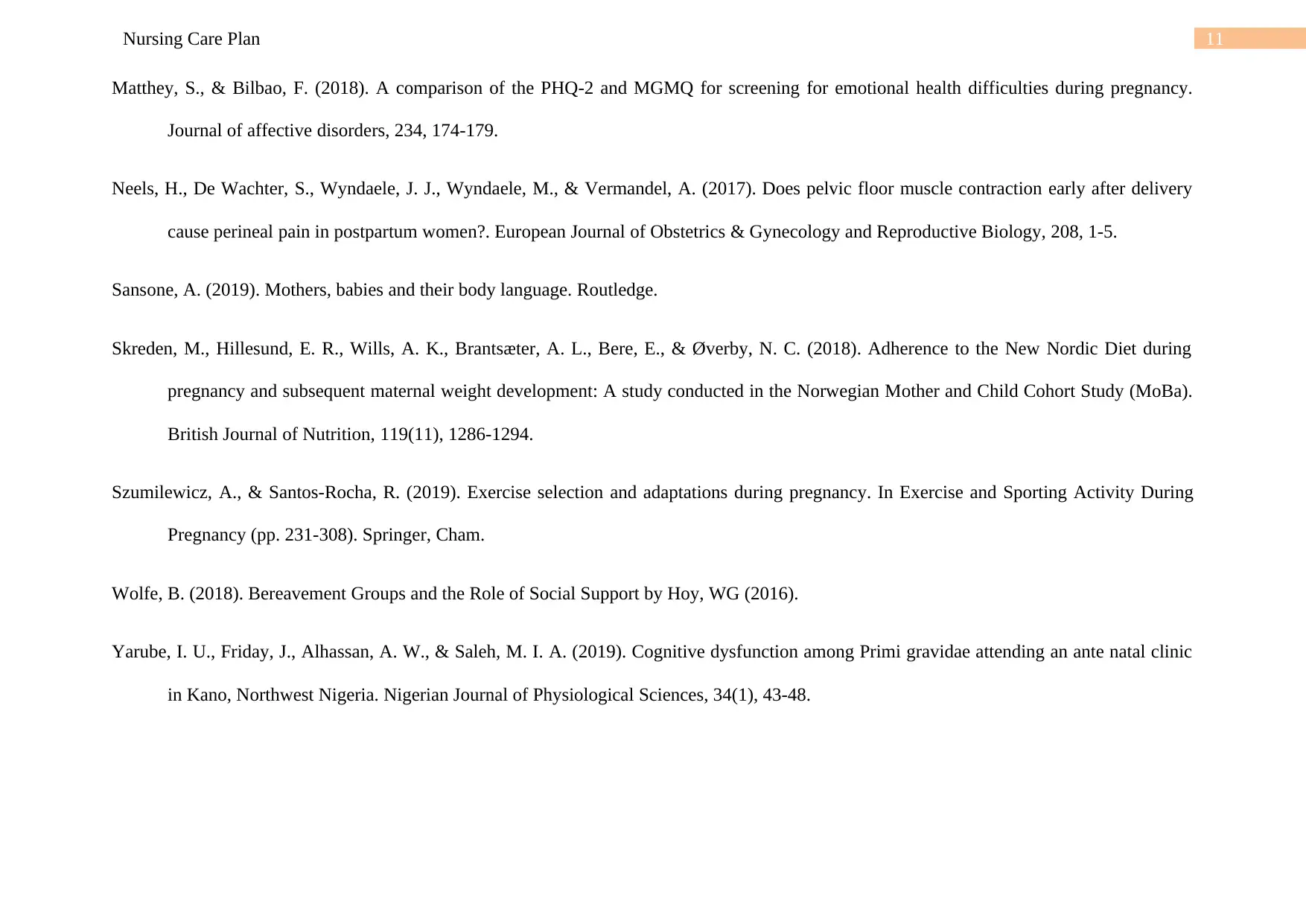
11Nursing Care Plan
Matthey, S., & Bilbao, F. (2018). A comparison of the PHQ-2 and MGMQ for screening for emotional health difficulties during pregnancy.
Journal of affective disorders, 234, 174-179.
Neels, H., De Wachter, S., Wyndaele, J. J., Wyndaele, M., & Vermandel, A. (2017). Does pelvic floor muscle contraction early after delivery
cause perineal pain in postpartum women?. European Journal of Obstetrics & Gynecology and Reproductive Biology, 208, 1-5.
Sansone, A. (2019). Mothers, babies and their body language. Routledge.
Skreden, M., Hillesund, E. R., Wills, A. K., Brantsæter, A. L., Bere, E., & Øverby, N. C. (2018). Adherence to the New Nordic Diet during
pregnancy and subsequent maternal weight development: A study conducted in the Norwegian Mother and Child Cohort Study (MoBa).
British Journal of Nutrition, 119(11), 1286-1294.
Szumilewicz, A., & Santos-Rocha, R. (2019). Exercise selection and adaptations during pregnancy. In Exercise and Sporting Activity During
Pregnancy (pp. 231-308). Springer, Cham.
Wolfe, B. (2018). Bereavement Groups and the Role of Social Support by Hoy, WG (2016).
Yarube, I. U., Friday, J., Alhassan, A. W., & Saleh, M. I. A. (2019). Cognitive dysfunction among Primi gravidae attending an ante natal clinic
in Kano, Northwest Nigeria. Nigerian Journal of Physiological Sciences, 34(1), 43-48.
Matthey, S., & Bilbao, F. (2018). A comparison of the PHQ-2 and MGMQ for screening for emotional health difficulties during pregnancy.
Journal of affective disorders, 234, 174-179.
Neels, H., De Wachter, S., Wyndaele, J. J., Wyndaele, M., & Vermandel, A. (2017). Does pelvic floor muscle contraction early after delivery
cause perineal pain in postpartum women?. European Journal of Obstetrics & Gynecology and Reproductive Biology, 208, 1-5.
Sansone, A. (2019). Mothers, babies and their body language. Routledge.
Skreden, M., Hillesund, E. R., Wills, A. K., Brantsæter, A. L., Bere, E., & Øverby, N. C. (2018). Adherence to the New Nordic Diet during
pregnancy and subsequent maternal weight development: A study conducted in the Norwegian Mother and Child Cohort Study (MoBa).
British Journal of Nutrition, 119(11), 1286-1294.
Szumilewicz, A., & Santos-Rocha, R. (2019). Exercise selection and adaptations during pregnancy. In Exercise and Sporting Activity During
Pregnancy (pp. 231-308). Springer, Cham.
Wolfe, B. (2018). Bereavement Groups and the Role of Social Support by Hoy, WG (2016).
Yarube, I. U., Friday, J., Alhassan, A. W., & Saleh, M. I. A. (2019). Cognitive dysfunction among Primi gravidae attending an ante natal clinic
in Kano, Northwest Nigeria. Nigerian Journal of Physiological Sciences, 34(1), 43-48.
1 out of 12
Related Documents
Your All-in-One AI-Powered Toolkit for Academic Success.
+13062052269
info@desklib.com
Available 24*7 on WhatsApp / Email
![[object Object]](/_next/static/media/star-bottom.7253800d.svg)
Unlock your academic potential
© 2024 | Zucol Services PVT LTD | All rights reserved.





